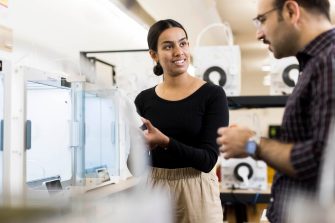Bioengineering a healthy future

Engineering & Technology Faculty – ARWU Shanghai Subject Rankings and QS World University Rankings by Subject

Teaching and Research – Times Higher Education University Rankings

$10M philanthropic donation in 2020 to establish the Tyree Institute of Health Engineering
Why study Biomedical Engineering?
Be a part of the future of life-changing and life-saving innovation. This might look like developing systems to maintain and enhance life, designing body parts and artificial organs, or creating and manufacturing medical devices. You’ll walk away with a solid background in mathematics, natural sciences and computing, with specialisations in healthcare-related fields, such as implantable bionics, drug delivery systems, medical imaging, and robotic surgery.
A Biomedical Engineer analyses and designs solutions to problems in biology and medicine to improve people's lives. Interested in humans and machines? This is the path for you.
What is Biomedical Engineering?
As a Biomedical Engineer, you’ll examine medical problems and solve them by applying your engineering knowledge. Sitting at the intersection of technology and human biology, Biomedical Engineering applies the latest developments in computing, robotics and nanotechnology to medicine.
A Biomedical Engineer analyses and designs solutions to problems in biology and medicine to improve people's lives. Interested in humans and machines? This is the path for you.








